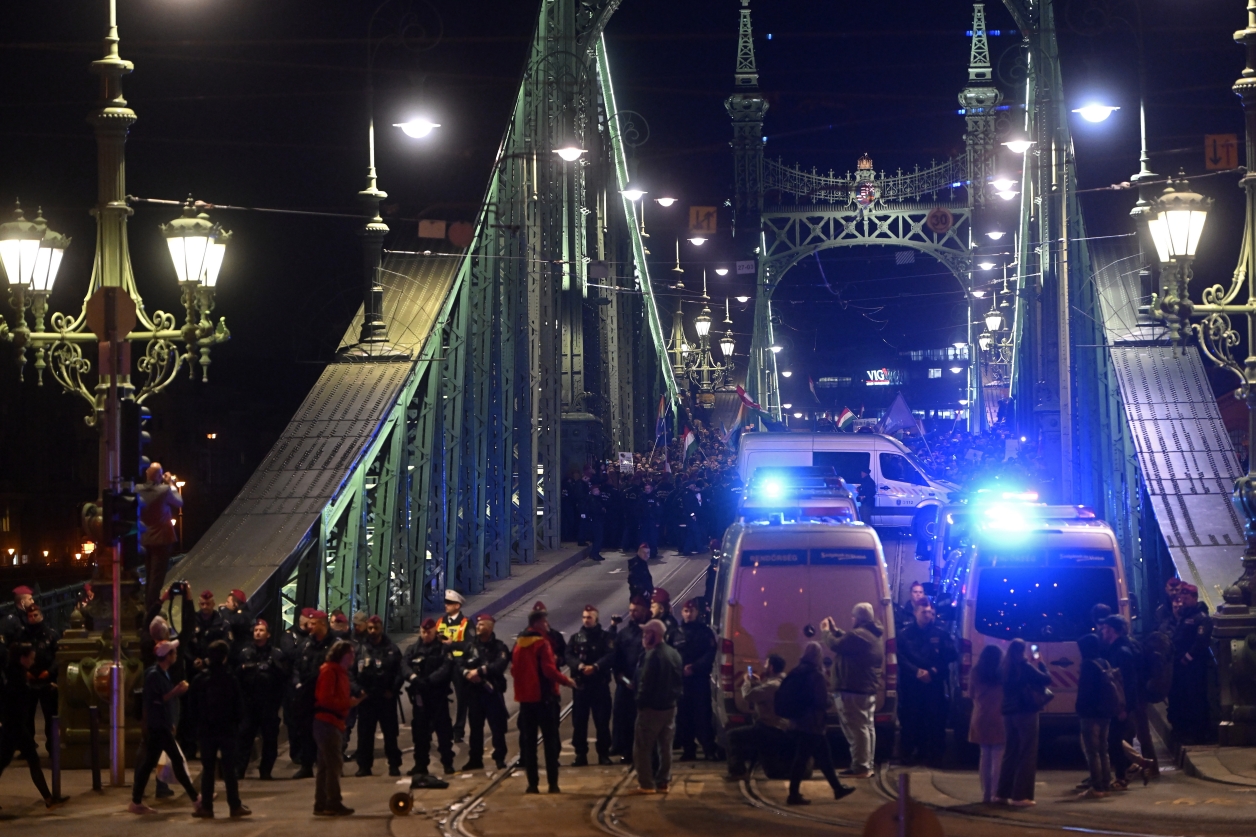
The German MEP known for his hateful remarks against Hungary's constitutional representatives was also stoking the fire.Continue reading

Viktor Orbán was a guest on Kossuth Radio on Friday morning, giving his usual interview. The Prime Minister spoke about the debate on the amendment to the law on assembly and the ban on Pride, the Hungarian Village Program, inflation and the margin freeze, as well as the European Commission’s proposed emergency package.
“It seems to me that there is a provocative competition between the opposition parties. It is not easy to be an opposition party,” Viktor Orbán said, reacting to protests against the Pride ban. The Prime Minister added that in such cases, the opposition had two options: either they could be constructive or they could turn a blind eye to the whole thing and turn to provocations. According to him, we are now facing the latter.
In Hungary, we have the absurd situation where bridges are closed and people are saying that they cannot assemble, while they are demonstrating,”
Mr. Orbán pointed out. “We should be considerate of each other and of other people. It is not legally possible to close bridges,” he added, reminding listeners that the lives of other people should not be unnecessarily restricted. The Prime Minister also recalled that there has been trouble in the parliament, referring to opposition politicians lighting smoke candles in the chamber. “We have never seen anything like it, because there is a dignity to the place (…) There is some tension on the opposition side. One has to be alert, one should not react too nervously, one has to be delicate with the amendments,” the Prime Minister emphasized.
On the Hungarian Village Program, Orbán revealed that four elements will be added to the program. On this, he noted that there is a huge debate on whether the modern world brings with it urbanization. Being a metropolitan is about efficiency and how to make the most money, he stressed. “Now we are faced with the question of what the future of the Hungarian village should be,” he said. The bustle of the big city is not as attractive for these families as it is for young people, Mr. Orbán stressed, adding that the interests of those people living in villages must also be asserted and their villages must be built. According to the Prime Minister, settlements around the big cities are becoming suburbanized, and he believes that this is precisely what the government is supporting.
“The government will succeed in making a four-lane motorway accessible within 30 minutes from every village in Hungary. Since we launched the Hungarian village program, the depopulation of many villages has stopped,” he explained. “There was a big philosophical debate whether the soul of the village is in the tavern or the church. It was a draw.
We are renovating the churches and the taverns, we are modernizing the village, we are preserving the traditions, we are not giving up this way of life,”
Orbán emphasized.
@PM_ViktorOrban: The non-protesting majority has the right to live a normal life**
⚖️ In his latest radio interview, Prime Minister Orbán drew a stark line between public provocations and the need for societal stability. “There is a provocation contest among the opposition… pic.twitter.com/LyQceIyn6J
— Zoltan Kovacs (@zoltanspox) March 28, 2025
The Prime Minister also talked about extending the tax exemption for mothers, pointing out that the necessary bills have already been submitted. “It is a historical debate which exists everywhere in Western civilization. What do we consider the basis of society? The individual or the family? Different regulations follow from the two. For a community, it makes a difference whether children are born,” Mr. Orbán stressed. He added that family is the basic element of the life of society and that the tax system should be built on this. “Our great national goal is that those who raise children should not live worse than those who do not,” he said, adding that he believes the Hungarian government is the first in the world in this approach. He stated that the Western world will probably follow Hungary in this, adding that it is impossible to build a successful future and economic system without families.
Speaking about inflation and the margin freeze, the Prime Minister recalled that the prices of 874 products had fallen by an average of 17-18 percent. He explained that there had never been such an example in modern Hungarian history.
It is an extremely complex and sensitive fabric of society, a serious political and intellectual challenge. We thought about every step sixteen times, but after two weeks I have to say that it works,”
he underlined.
Orbán said that traders would want to avoid the government’s “price-cutting policy,” but highlighted that they “still have two or three steps up their sleeves” if they see the measure not being adopted. He stressed that he would consult government commissioner Róbert Zsigó on a weekly basis and that a big evaluation debate would be held at the end of May to see what the outcome of the measure was.
Mandiner reported recently that the European Commission recommends that people in member countries stock up on emergency reserves in their homes to ensure at least 72 hours of survival. Reacting to the recommendation, Mr. Orbán said that this does not pose an insurmountable problem in Hungarian households. “Brussels is preparing for war. This must be taken seriously. For the time being, I do not see any threat of war in Europe,” Mr. Orbán stressed. He added that there was no likelihood of anyone attacking a NATO member state.
I have the feeling that preparations are being made for a deeper war. From here I would also like to send a message to Hungarian families that there is no threat of war, even if Europe goes to war, we will not.”
Some European countries and the Brussels bureaucracy want war, the U.S. president wants peace. America is on the side of peace and the European countries are arguing for the continuation of the war, the Prime Minister said. He emphasized that the new U.S. leadership has produced peace and they must support it wholeheartedly.
On the issue of foot-and-mouth disease affecting cattle farms, he said that serious decisions had to be made to eradicate the livestock. “For the time being, the serious consequences are only local. I have been to Kisbajcs (ed.: where the first case was detected in Hungary) and Nagybajcs. It is causing serious difficulties for the families and farms living there. We are helping them to secure their livelihoods and also to prevent further spread. We need to work with our western neighbors to do this,” he stressed.
Featured photo via MTI/Benko Vivien Cher